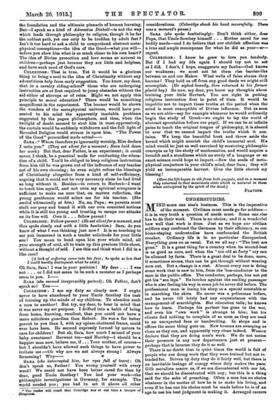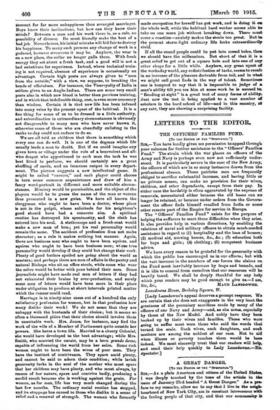UNDERSTUDIES.
MIND some one else's business. This is the imperative of the moment. Civilians must needs go for soldiers— it is in very truth a question of needs most. Some one else has to do their work. There is no choice; and it is wonderful how well that work is done. Just as we hope our civilian soldiers may confound the Germans by their efficiency, so our home-staying understudies have confounded the British croaker. Ordinary life is in no particular disorganized. Everything goes on as usual. Yet we all say: "The beat are gone." It is a great thing for a country when its second-best is as good as oars, and when the too old at forty " ory can be silenced by facts. There is a great deal to be done, more, it sometimes seems, than can be got through without wearing men out. But a change is a rest. Almost every one is doing some work that is new to him, from the 'hus.00nductor to the man in the public! office. The conductor, perhaps, has not yet got his "sea lege." lie lurches against the smiling passenger who is also feeling his way in some job he never did before. The professional man is losing his sleep es a special constable or in searching the skies. He never was a policeman before, and he never till lately had any acquaintance with the management of searchlights. But education tells ; he knows how to learn. Perhaps his partner has gone to the war, and even his "own work" is strange to him; but hie clients find nothing to complain of as soon as they are used to an unexpected face or handwriting. In shops and in offices the same thing goes on. New brooms are sweeping as clean as they can, and apparently very clean indeed. Women declare that they are doing men's work. We do not notice their presence in any new departments just at present— perhaps that is because they do it so well. There is no doubt that in quiet times the world is full of people who are doing work that they were trained but not in- tended for. Driven by duty they do it fairly well, but there is an inevitable leakage of energy where duty makes the pace. Glib moralists assure us, if we are discontented with our lot, that we should be discontented with any; but this is a thing said for the sake of preaching. Often a man has no choice whatever in the matter of how he is to make his living, and even if ho has one his choice must be made before he is of an age to use his best judgment in making it. Arranged careers
amount for far more unhappiness than arranged marriages. Boys know their inclinations, but how can they know their Minds? Between a man and his work there is, as a rule, no possibility of divorce. Re must literally make the best of a bad job. Novell beless, his initial mistake will bid fair to destroy his happiness. To many such persons any change of work is a godsend, however strenuous it may be. Anyhow, the wear is on a new place, the collar no louger galls them. With fresh energy they set about a fresh task, and a good will is not a bad substitute for experience. Indeed, where technical train- ing is not required, absence of experience is occasionally an advantage. Certain high posts are always given to "men from the outside," with a view, we suppose, to breaking the bonds of officialism. For instance, the Viceroyalty of India is seldom given to an Anglo-Indian. There are some very small posts also in which new blood is better than previous training, and in which that indefinable thing, zest, is even more necessary than wisdom. Certain it is that new life has been infused into many veins by the present upset of the habitual. It is a fine thing for some of us to be dressed in a little authority, and subordination in extraordinary circumstances is obviously not disagreeable to many men who have never known it, otherwise some of those who are cheerfully enlisting in the ranks to-day could not endure to do so.
We are all told as children that there is something which every one can do welL It is one of the dogmas which life usually leads a man to doubt. But if we could imagine any given town or village under the rule of a benevolent and alt- wino despot who apportioned to each man the task he was beat fitted to perform, we should certainly see a great shuffling of cards, and an immense output in every depart- ment. The picture suggests a new intellectual game. It might be called "careers," and each player could choose in turn some common acquaintance and draw of him a fancy word-portrait in different and more suitable circum- stances. Mimicry would be permissible, and the object of the players would he to gneiss the name of the man or woman thus presented in a new guise. We have all known the clergyman who ought to have been II doctor, whose place is not in the pulpit, whose solicitude for his neighbour's good should have had a concrete aim. A spiritual routine has destroyed his spontaneity, and the cloth has entered into his souL A stethoscope and a frock-coat would make a new man of him; yet his real personality would remain the same. The accident of profession does not make character ; as a rule it makes nothing but manner. Again, there are business men who ought to have been squires, and squires who ought to have been business men; whose true personality would develop if they could but change their work. Plenty of good butlers spoiled are going about the world as masters ; and perhaps there are men of affairs in the pantry and natural Bishops who sit on elites stools, while some who wear the mitre would be better with pens behind their ears. Some journalists might have made real men of letter if they bad not exhausted their brains by over-production, and surely some men of letters would have been more in their place under obligation to produce at short intervals printed matter which the runner could read.
Marriage is in ninety-nine eases out of a hundred the only satisfactory profession for women, but in that profession how many dislike their workl We do not mean that they are unhappy with the husbands of their choice; but it seems so often a thousand pities that their choice should involve them in unsuitable work. Mrs. dolma, for instance, way find the work of the wife of a Member of Parliament quite outside her powers. She hates a town life. Married to a cheery Colonial, the would have developed to the best advantage; while Mrs. Smith, who married the curate, may be a born grande dame, capable of influencing the world from her salon. Some rich women ought to have been the wives of poor men. They Dave the instinct of contrivance. They spare amid plenty, and cannot be said to adorn their condition; while lavish generosity lurks in the Noel of the mother who must spare that her children may have plenty, and who must always, by reason of her nature, spare and contrive badly, producing a sordid result because she is working against the grain. For women, as for men, life has very much changed during the last few months. The ordinary social routine has stopped, and its stoppage has caused to those who dislike it a sense of relief and a renewal of strength. The woman who formerly made occupation for herself has got work, and in doing it ea the 'whole well, while the habitual hard worker seems able to take on one more job without breaking down. There most come is reaction—anxiety makes the strain too great. Bat im the present storm-light ordinary life looks extraordinarily vivid.
If all the round people could be put into rowed boles, then we should have the millennium. Bat short of that it is a great relief to get out of a square bole and into one of any other shape for a little while. Anyhow, any great upset a the workaday world, any redistribution of tasks, seems to result in an increase of the pleasure derivable from toil, and in what we might call great nada in tho way of talent Sometime. one is tempted to say that it is impossible to judge of man's ability till you see him at some work he is unused to " Reading at sight" is a great test of many forms of ability. Just now the teat is being applied to a vast number of scholars in the hard school of life—and in this country, a any rate, they are showing a surprising facility.







































 Previous page
Previous page